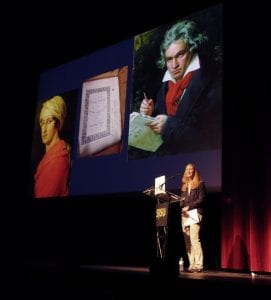Allegretto begins. Its soft, haunting rhythm demands your complete attention.
We all know those famous notes: Dunn dun dun dunn dunn.
The rhythm slowly begins to swell as the entire orchestra joins in. The music shifts before falling back into quiet mystery. 
For over two hundred years, scholars, musicians, and psychologists have studied the world-famous second movement of Beethoven’s 7th Symphony. Other composers strive to recreate it. Filmmakers have used it to amplify emotions on screen. Citizens of East Berlin moved with it as they walked over the remains of the Berlin Wall. Allegretto has a seemingly endless ability to captivate and there are a million different theories as to why.
And now it has come to SJSU. Literally. In October, the Ira F. Brilliant Center for Beethoven Studies at the Martin Luther King Jr. Library purchased a signed, first-edition score of Beethoven’s 7th, addressed to a woman named Antonie Brentano, who many believe to be Beethoven’s “Immortal Beloved”. The center, with the largest collection of Beethoven-related manuscripts and artifacts outside of Europe (over 31,000 items!), was eager to acquire the score, as it directly related to an original manuscript the Center already maintains. With the help of many generous donors, the Center raised the funds needed, successfully making sure the score remains available to the public.
But apart from adding an impressive artifact to the collection, what is the significance of the score? Doctor Fred Cohen, Director of the School of Music and Dance, has some thoughts. “Beethoven is an iconic figure who is used in all kinds of ways, manipulated by different people to present different perspectives,” he says. “So to have original data about Beethoven on hand lends credence to fresh perspectives on how to understand Beethoven, and by that, I mean his music.”
Thinking about these perspectives can add context to the music; it helps us understand what the music is about and offers new potentialities and interpretations.
“Was he really in love with Brentano?” Cohen asks. “And if so, does that seep into the music—is it expressed in the music? You could make an argument for it, but who knows? He’s not around to say. But it brings up these possibilities.”
In general, when we talk about understanding music, or putting it into context, we tend to think of emotion, or musicality, first. How does the song make us feel? Is this what the artist was feeling? But that’s only part of the response, Cohen explains: “The emotion in music can inform a person’s perspectives and the way you play, the way you listen; it doesn’t have to, but it can. And that opens up the color of what music can do.”
Beethoven’s 7th has emotionally affected audiences since its debut in December of 1813, when it was performed during a series of concerts to raise money for Austrian soldiers wounded in battle against the French armies of Napoleon. The Austrian army had suffered a number of defeats against Napoleon and Vienna was occupied by French forces in 1805 and 1809. By 1813, however, the tides of war were turning against the French. Austrian victories in 1813 marked the beginning of Napoleon’s downfall and a wave of optimism once again swept across Vienna. In the newly energized city, the performance of Beethoven’s 7th Symphony was immediately celebrated and public demand ensured it was frequently performed over the next weeks. That it is still recognized and performed to this day attests to the timeless emotional qualities Beethoven affixed to his score.
“You can spend your entire life learning about yourself and what you respond to,” Cohen says. “Be open to whatever you’re listening to, if you can. And if you have a response to it, it’s worth figuring out why.”
SJSU’s School of Music and Dance provides many opportunities to explore and learn about music. The College offers a wide-range of academic degrees that prepare students for successful careers. Explore music outside of class at one of the many events organized by the college! Check out their event page here: http://events.ha.sjsu.edu/musicanddance/
We’d like to thank those who donated during the Beethoven’s 7th fundraising campaign! The signed 7th Symphony score is available for viewing at the Ira F. Brilliant Center for Beethoven Studies until December 15, 2018. The center is located on the fifth floor of the Martin Luther King, Jr. Library. Come back in January 2019 and say hello to the incoming director, Dr. Erica Buurman!
For more information, visit the Beethoven Center’s website: http://www.sjsu.edu/beethoven/

